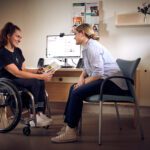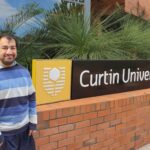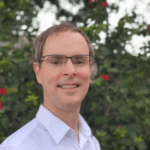Curtin commerce students Zac Farrow and Willem Poot joined some of the world’s brightest minds to transform a world-changing idea into a workable prototype while undertaking Stanford’s International Honors Program in the US.
For seven weeks, Farrow and Poot worked on a ‘moonshot’ project that addressed the UN’s Sustainable Development Goals at the Silicon Valley Innovation Academy (SVIA). Their invention, a biosensor that quantifies mental health, so impressed Stanford researchers that it was sent to a laboratory to be developed.
“The purpose of the academy is for students to organise themselves into multicultural and multidisciplinary teams and come up with an almost audacious solution to a problem,” Farrow says.
“Our team had people from Australia, Sweden and Turkey. We selected the UN goal of improving mental health, and came up with idea to quantify the impact of external stimuli on a person’s wellbeing.
“For example, say you drink a can of Coke, you know the effect it will have on your physical health – the exact nutrition information, such as energy and calories, is measurable and available on the label.
“We wanted to know if was possible to develop something that would give you the same quantifiable information for your mental health, so a person would be able to accurately determine what experiences were ‘good’ or ‘bad’ for them.”
Farrow and his team spent two weeks extensively researching current technologies that could be adapted to measure the brain’s chemical responses to external stimuli.
“We found that by placing a biosensor in a person’s mouth, we could take a live reading of their saliva, which contains trace elements of neurotransmitters, such as serotonin, dopamine and cortisol, all of which affect our physical and psychological functions.
“Those neurotransmitter levels could then be converted into a single measurement to give the user an indication of their overall mental wellbeing at a particular point in time.
“Further research indicated that saliva is a key diagnostic fluid in the early detection of many cancers, as well as respiratory, cardiovascular and sexually transmitted diseases. The chip could indicate to the user that they need to book an appointment with their GP, as well as provide the doctor with information on what to look for.”

The biosensor has a variety of mental health applications, but after advice from their SVIA coaches, Farrow’s team decided to focus on promoting the biosensor to the US military, where it could help service personnel suffering from post-traumatic stress disorder (PTSD).
“Our research showed that PTSD is a significant problem for many active and retired US soldiers. The biosensor could help those soldiers with PTSD to make informed decisions about what helps or hinders their emotional wellbeing, such as being exposed to certain sights, sounds and environments,” Farrow says.
The team have submitted a Stanford-endorsed research grant to the US military to build the biosensor, and may return to the US next year to progress the prototype if their application is successful.
Until then, Farrow and Poot are back on Australian soil and completing their final year exams. Farrow says his Stanford experience has given him many more graduate options to consider, and he would encourage all Curtin commerce students to apply to Stanford’s honors program.
“I can’t say there’s one thing I learned that really stood out for me, but the overall opportunities that Curtin and Stanford have given me has changed the course my life was going on.”



